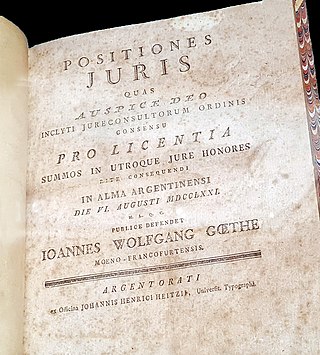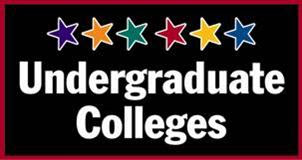
Postgraduate education, graduate education, or graduate school consists of academic or professional degrees, certificates, diplomas, or other qualifications usually pursued by post-secondary students who have earned an undergraduate (bachelor's) degree.

The Open University (OU) is a public research university and the largest university in the United Kingdom by number of students. The majority of the OU's undergraduate students are based in the United Kingdom and principally study off-campus; many of its courses can also be studied anywhere in the world. There are also a number of full-time postgraduate research students based on the 45 hectares university campus at Walton Hall, Milton Keynes, Buckinghamshire, where they use the staff facilities for research, as well as more than 1,000 members of academic and research staff and over 2,500 administrative, operational and support staff.
An academic degree is a qualification awarded to a student upon successful completion of a course of study in higher education, usually at a college or university. These institutions often offer degrees at various levels, usually divided into undergraduate and postgraduate degrees. The most common undergraduate degree is the bachelor's degree, although some educational systems offer lower-level undergraduate degrees such as associate and foundation degrees. Common postgraduate degrees include engineer's degrees, master's degrees and doctorates.

Sorbonne University is a public research university located in Paris, France. The institution's legacy reaches back to the Middle Ages in 1257 when Sorbonne College was established by Robert de Sorbon as one of the first universities in Europe.
A bachelor's degree or baccalaureate is an undergraduate degree awarded by colleges and universities upon completion of a course of study lasting three to six years. The two most common bachelor's degrees are the Bachelor of Arts (BA) and the Bachelor of Science. In some institutions and educational systems, certain bachelor's degrees can only be taken as graduate or postgraduate educations after a first degree has been completed, although more commonly the successful completion of a bachelor's degree is a prerequisite for further courses such as a master's or a doctorate.
Regulation and licensure in engineering is established by various jurisdictions of the world to encourage life, public welfare, safety, well-being, then environment and other interests of the general public and to define the licensure process through which an engineer becomes licensed to practice engineering and to provide professional services and products to the public.

A thesis, or dissertation, is a document submitted in support of candidature for an academic degree or professional qualification presenting the author's research and findings. In some contexts, the word thesis or a cognate is used for part of a bachelor's or master's course, while dissertation is normally applied to a doctorate. This is the typical arrangement in American English. In other contexts, such as within most institutions of the United Kingdom and Republic of Ireland, the reverse is true. The term graduate thesis is sometimes used to refer to both master's theses and doctoral dissertations.
A Master of Laws is an advanced postgraduate academic degree, pursued by those either holding an undergraduate academic law degree, a professional law degree, or an undergraduate degree in a related subject. In most jurisdictions, the LL.M. is the advanced professional degree for those usually already admitted into legal practice.
A medical school is a tertiary educational institution, professional school, or forms a part of such an institution, that teaches medicine, and awards a professional degree for physicians. Such medical degrees include the Bachelor of Medicine, Bachelor of Surgery, Master of Medicine, Doctor of Medicine (MD), or Doctor of Osteopathic Medicine (DO). Many medical schools offer additional degrees, such as a Doctor of Philosophy (PhD), master's degree (MSc) or other post-secondary education.

The Master of Music is, as an academic title, the first graduate degree in music awarded by universities and conservatories. The MM combines advanced studies in an applied area of specialization with graduate-level academic study in subjects such as music history, music theory, or music pedagogy. The degree, which takes one or two years of full-time study to complete, prepares students to be professional performers, conductors, and composers, according to their area of specialization. The MM is often required as the minimum teaching credential for university, college, and conservatory instrumental or vocal teaching positions.

A licentiate is an academic degree present in many countries, representing different educational levels. It may be similar to a master's degree when issued by pontifical universities and other universities in Europe, Latin America, and Syria.

Manchester Community College (MCC) is a public community college in Manchester, Connecticut. Founded in 1963, it is the third-oldest of the twelve community colleges governed by the Connecticut State Colleges & Universities system (CSCU) and has graduated more than 23,000 students since the first class in 1965.
In higher education, a course is a unit of teaching that typically lasts one academic term, is led by one or more instructors, and has a fixed roster of students. A course usually covers an individual subject. Courses generally have a fixed program of sessions every week during the term, called lessons or classes. Students may receive a grade and academic credit after completion of the course. Courses can either be compulsory material or "elective". An elective is usually not a required course, but there are a certain number of non-specific electives that are required for certain majors. The entire collection of courses required to complete an academic degree is called a program of studies.

The Schreyer Honors College is the honors program of the Pennsylvania State University. Founded in 1980 as the University Scholars Program, it was expanded and renamed in 1997 in response to a $30 million gift by William and Joan Schreyer. Schreyer was one of three honors colleges, along with those at Arizona State and Mississippi, to be listed by Reader's Digest in its "America's 100 Best" list published in May, 2005. On November 17, 2006, the Schreyers pledged an additional gift of $25 million to the Schreyer Honors College. Having contributed more than $58 million to Penn State, they were the largest family donors in the school's history, prior to the recent donation of $88 million from Terry and Kim Pegula for a new arena.

Education in Bosnia and Herzegovina has a long history, the first classifiable higher-education institution having been established a school of Sufi philosophy by Gazi Husrev-beg in 1531, with numerous other religious schools following suit over time. In 1887, under de facto Austro-Hungarian Empire control, a Sharia Law School began a five-year program. In the 1940s the University of Sarajevo became the city's first secular higher education institute. In the 1950s post-bachelaurate graduate degrees became available. Severely damaged during the war, it was recently rebuilt in partnership with more than 40 other universities. There are various other institutions of higher education, including: University of Banja Luka, University of Mostar, University of Tuzla, University of Zenica, University of East Sarajevo, University Džemal Bijedić of Mostar, University of Bihać, American University in Bosnia and Herzegovina, etc.

Engineering education is the activity of teaching knowledge and principles to the professional practice of engineering. It includes an initial education, and any advanced education and specializations that follow. Engineering education is typically accompanied by additional postgraduate examinations and supervised training as the requirements for a professional engineering license. The length of education, and training to qualify as a basic professional engineer, is typically five years, with 15–20 years for an engineer who takes responsibility for major projects.

Ondokuz Mayıs University (OMU) is a major state university founded in 1975 in Samsun, Turkey. The university bears the name “19 May”, which marks the date when Mustafa Kemal Atatürk, founder of the Republic of Turkey, came to Samsun in order to start the War of Independence.
OMU consists of 16 Faculties, 1 Conservatoire, 3 Schools, 11 Vocational Schools and 5 Institutes. Its 2,175-acre main campus is centred on Atakum municipality in Samsun.
Based on University Ranking by Academic Performance (URAP) data, OMU ranks 14th among Turkish universities with medical schools.
The basic requirement for pharmacists to be considered for registration is often an undergraduate or postgraduate pharmacy degree from a recognized university. In many countries, this involves a four- or five-year course to attain a bachelor of pharmacy or master of pharmacy degree.
In the United States, community colleges are primarily two-year public institutions of tertiary education. Community colleges offer undergraduate education in the form of an associate degree. In addition community colleges also offer remedial education, GEDs, high school diplomas, technical diplomas and tech certificates, and in rare cases, a limited number of 4-year bachelor's degrees. After graduating from a community college, some students transfer to a four-year college or university to continue their studies leading to a bachelor's degree. Community college is tuition-free for selected students in 47 states, often under the name College Promise. Most community college instructors have advanced degrees but serve as part-time low wage employees.

Stony Brook University has an undergraduate population of around 15,000 students. To create a sense of community, the Undergraduate Colleges of Stony Brook University were developed. These Undergraduate Colleges function as smaller communities within the larger university and are themed to provide an academic aspect to each student's interests. They are particularly invested in creating an enjoyable first-year student experience but also offer services to other students at the educational institute. Notable programs offered are first-year advising, UGC-themed events, and smaller seminar courses.











